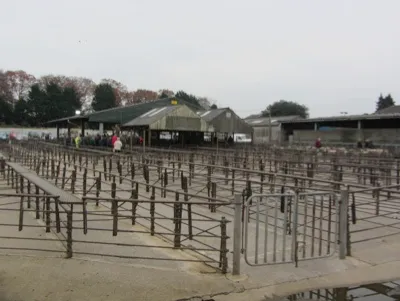The signs for Monmouthshire’s new cattle market are up and they’re pointing away from the centre of Abergavenny, it’s traditional home. Having been held in the centre of the town for the past 150 years, the market has been moved to a 27 hectare site near Raglan nine miles away.
The new site officially opened last Friday by Adam Henson (29 November 2013) but when I nipped into town the following Tuesday to see the doctor, I noticed that the old market was still going. The auctioneer was rattling though a few stalls of sheep and there were 20 or so farmers in attendance but the site felt rather empty and sad. Meanwhile, the new market will hold its first sale on 18 December.

Tuesday has always the best day to visit Abergavenny – a town blessed with at least five great markets a week. On Tuesdays there are three times as many stalls as normal and they spill from the magnificent market hall all through the surrounding carpark and almost meet the livestock market across Lion Street, which is usually held on Tuesdays and Wednesday. Cafes and pubs throng with shoppers, their numbers swelled by farmers and their wives (in their Sunday best!) dipping in from the livestock auctions to catch up with a few bargains and friends.
I wonder how this buzz will change once the market closes for good and the farmers head to the sparkling new but rather lonely site in the Monmouthshire countryside.
Many farmers and their unions welcome the move, not least because access will be easier. Trailers and vans are huge these days and getting dozens of them in and out of the narrow streets of Abergavenny must be a logistical nightmare.
Monmouthshire Council has also supported the move, and says that a Morrisons supermarket will be built on the existing site and “kick start a wider regeneration of the town,” says council deputy leader Bob Greenland.
But not all locals are happy. A vocal opposition group Keep Abergavenny Livestock Market (KALM) says it speaks for farmers, townspeople, shopkeepers and visitors to Abergavenny and claims the town will lose its unique character once the market goes. “Abergavenny will become just another dreary clone town”.
The negative effects out-of-town supermarkets have on small towns has been well documented but the effect of supermarkets within towns is more nuanced according to a report on Countryfile by John Craven back in April 2011. He found that Yeovil in Somerset had lost out to supermarkets on its periphery while Totnes in Devon thrived, despite there being a supermarket in the centre. The thinking is that if a supermarket is centrally located, shoppers will also visit the rest of the town. But if it’s on the edge, it’s too much bother to then park a second time.
Abergavenny already has a Waitrose on the edge of town and an Aldi in the centre (as well as a small Tesco).
One undeniable loss is that there will no longer be a physical connection between the town and its surrounding farming community. At a time when town and country are portrayed as not understanding one another and farmers’ leaders are keen that "more and more people from all walks of life are recognising the importance that farming plays in their lives" (Meurig Raymond, Deputy President of the NFU), this severs one more vital connection between us and our food.

